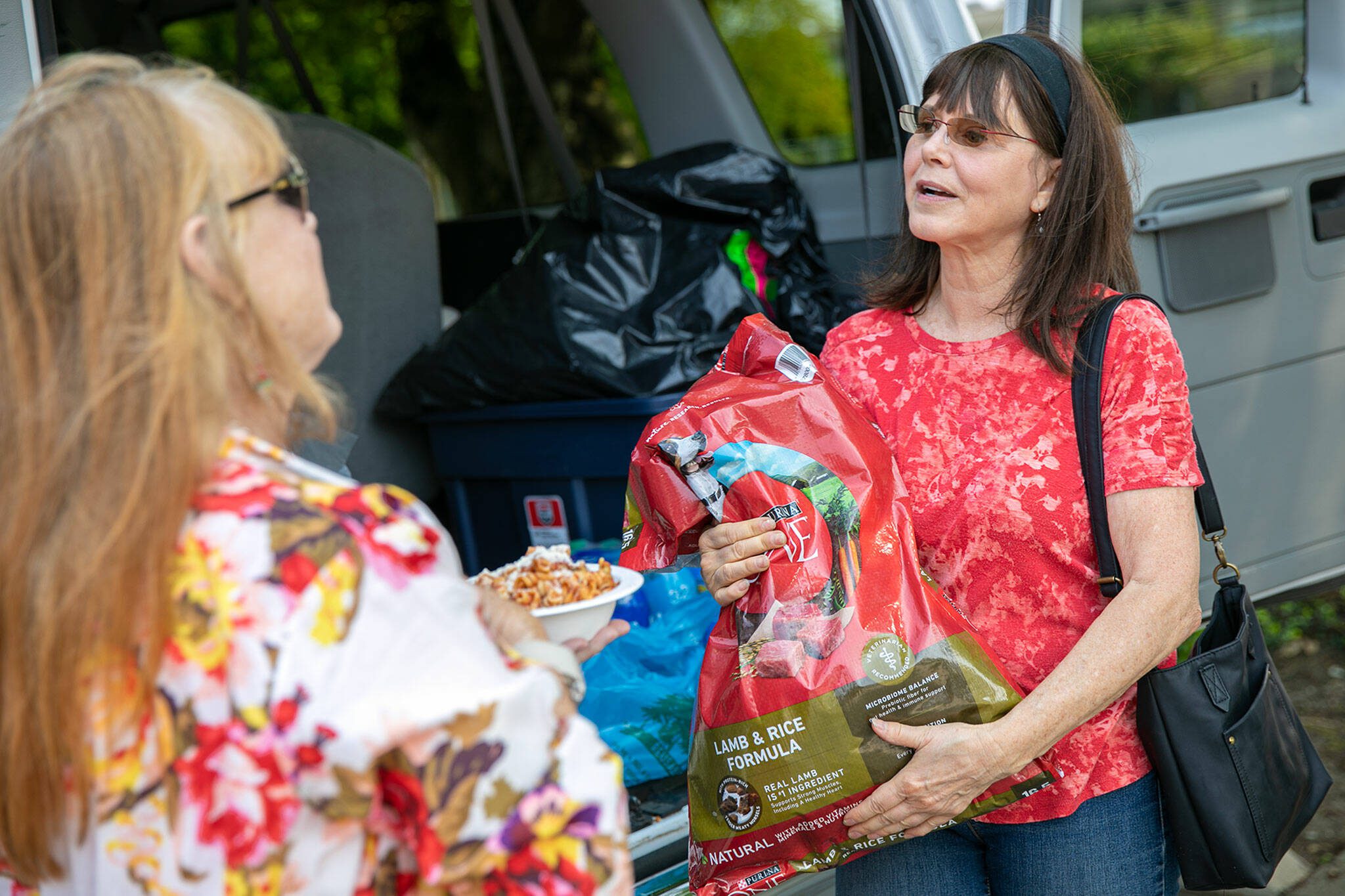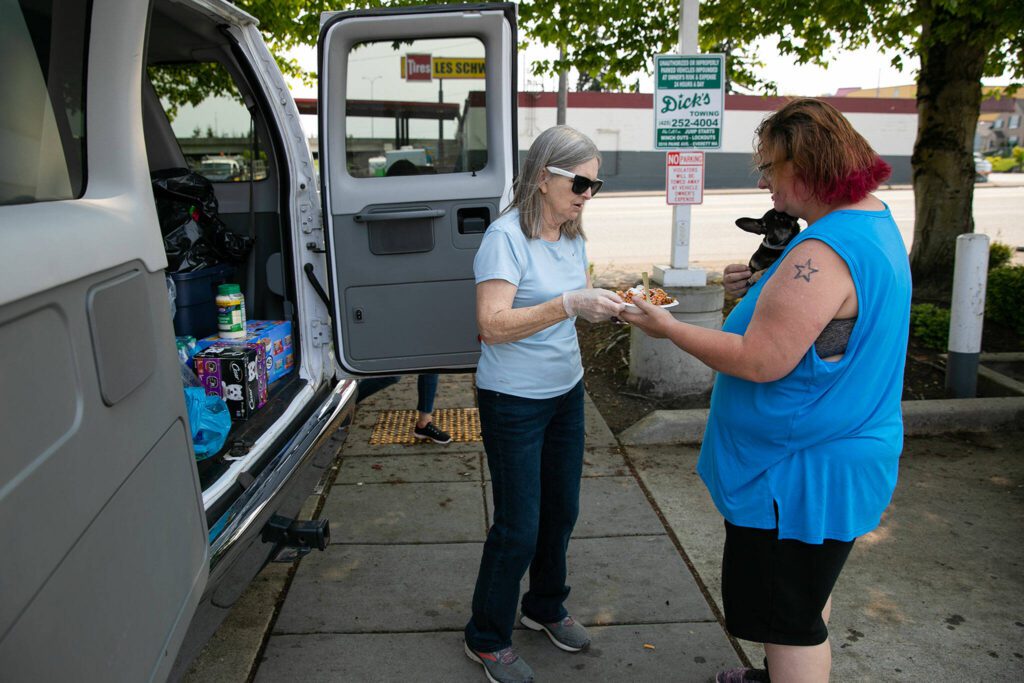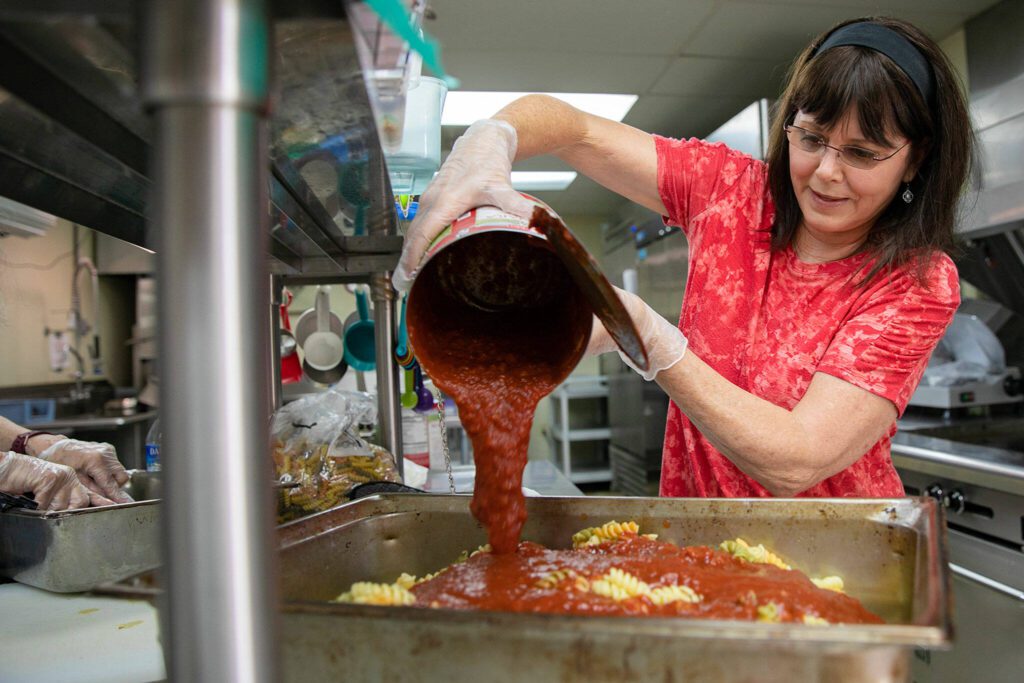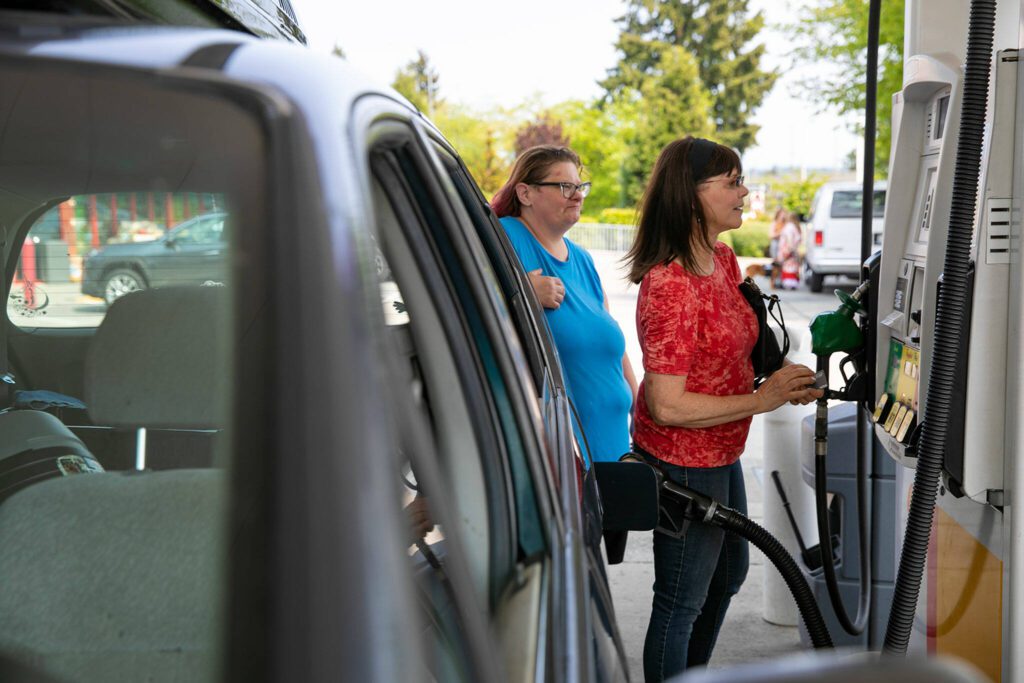EVERETT — On a typical Wednesday afternoon, Penelope Protheroe parks her white van loaded with food, clothing and supplies on Wall Street across from the courthouse. She serves as many as 60 people.
Within the hour, everything’s gone.
The past few weeks have been different, Protheroe said. People have been spreading out since the city expanded its “no sit, no lie” law on May 3, allowing Mayor Cassie Franklin to designate new buffer zones in which people are prohibited from sitting or lying down on public property, including sidewalks and streets. A violation is a misdemeanor with a penalty of up to 90 days in jail and a fine up to $500.
People also can’t give out food, goods, supplies or services in the zones without a permit.
The 2021 law created a buffer around the Everett Gospel Mission shelter. No new zones have been established yet.
“Today there might not be anybody,” Protheroe said as she and volunteer Debby Hays cooked pasta and meatballs in the Lake Stevens Senior Center kitchen on a recent Wednesday. “People are afraid of what (the law) really means and how seriously that will be enforced for them.”
Protheroe is the founder and president of Angel Resource Connection, a nonprofit providing much-needed supplies and support to people on the street. She’s worried changes to the city code will make handing out supplies more difficult.
‘They just want people to disappear’
Protheroe and others spoke against the new law at the council meeting May 3.
She saw firsthand the impact of the 2021 law. After it passed, she and others at Angel Resource Connection suddenly couldn’t find people they’d been serving for years.
“Several people, we never saw their faces again,” she said in an interview, “and maybe that’s the result they wanted. They just want people to disappear, go away … be somebody else’s problem.”
As Protheroe talked, she and Hays prepared the food and loaded it into the van, which also contained clothes and pet food.
Hays also volunteers to cook for the senior center’s lunches.
“They cook fancier food than I do,” Protheroe said laughing. “They have entrees. I have a casserole.”
But she grew serious when discussing the effect of the new ordinance. She suspected the law would be applied unequally.
“It is profiling,” she said. “There’s no way to hide it, there’s no way to back down from it. It is. You are eyeing somebody based on their appearance.”
The city hasn’t created a permit yet for the specific purpose of giving out food and supplies in buffer zones, though officials are developing one. Right now, those providing services must apply for a right-of-way permit “or other applicable permit or permission issued by” a city department, according to the ordinance.
The city’s Public Works department has issued two right-of-way permits for the buffer zone around the Mission since it was established in 2021. According to the city, these were the only two permits requested that mentioned the ordinance.
Protheroe said she’d been trying to get a permit from Public Works for two months and the process had not moved forward.
“We would like the city to partner with us,” she said. “We would like the city to say, we acknowledge that you work really hard, that you’re compliant in all areas. So you can go ahead and serve these people in these areas that we have banned.”
‘A cloak of shame’
Proponents of “no sit, no lie” say buffer zones are a tool to protect public safety and encourage neighbors to accept service providers. Last month, a plan to convert Hope Covenant Church into a homeless shelter fell through after outcry.
Everett’s mayor declined an interview for this story, with a city spokesperson noting Franklin had spoken at council meetings and released a statement explaining her position.
Earlier this month, Franklin wrote the expanded law “will give the City the ability to ensure safe access to services for individuals seeking care and also mitigate the negative impacts that sometimes occur around these (service provider) facilities.”
To Protheroe, that reasoning makes assumptions about people without homes. She particularly dislikes the conflation of homlessness and addiction.
There are some who use drugs, she said, but “that is not the face of homelessness anymore. (The) face of homelessness is your neighbor” who has fallen on hard times.
The negative image of homeless people is “like a cloak of shame” placed on them, she said.
Instead of criminalizing everyone, Protheroe argued, just address the people who are causing the problem.
Protheroe emphasized the value of the services provided by Angel Resource Connection.
“Have you ever noticed the distance that people have to walk to get to Salvation Army on 25th (Street) and then go to the men’s mission or the Carl (Gipson) Center?” she asked. “You almost burn off the calories that you’re going to make by eating the meal by walking to and from.”
She noted people are carrying their supplies with them.
That’s why, in her view, the city should welcome nonprofits like hers, which go out and meet people on the street.
Angel Resource Connection also gives out sleeping bags and “Shelterbags,” essential in cold winter months. A 2010 report from the National Coalition for the Homeless found 700 people “experiencing or at risk of homelessness” die from hypothermia per year.
It’s a topic that holds special weight for Protheroe, whose sister died from hypothermia in 2010 after fleeing her home due to domestic violence.
She said other organizations, including the county-funded Carnegie Resource Center, ask her for sleeping bags.
Angel Resource Connection has faced hostility in the past. Protheroe said people called the police on the group at least six times. Four times, she said, the Everett Gospel Mission made the call, though it was before the buffer zone had been established around the shelter.
‘Devastating’
The first stop for Protheroe and Hays was a Shell gas station on Everett Avenue. Two women, both living in their cars with their dogs, met them in the parking lot.
Holly declined to give her last name because some of her family members don’t know her situation. She lost her home in March after a conflict with her landlord — at least the third time she’s been homeless.
The new law is “devastating,” Holly said. She considers herself lucky to have a car, a storage unit and access to showers at the YMCA. Others are less fortunate, she said.
Putting those people in jail “serves no purpose,” she said, adding she’d seen people reoffend just to get access to the food and shelter in jail again.
Holly said she once worked as a police officer and she acknowledged there were issues at times with people blocking sidewalks in “vulnerable spots.” What’s needed are programs that help people get off the street, she said, not punishment.
“I don’t know what the answer is,” Holly said. “But I don’t understand why they did it the way they did.”
Organizations like Angel Resource Connection provide support to people who feel alone, she said.
“It gives you hope,” she said. “It makes you know that people really care and that they love you just because you’re here. Not for any reason other than that you’re alive.”
Pam Flower, who lives in her car with her dog Cricket, said “no sit, no lie” was going to have a big impact.
“Not everybody has somewhere to go during the day,” she said. She noted that in the summer, lying under trees gives people a chance to get out of the sun and heat.
Flower said people have been leaving for other cities like Marysville and Edmonds as a result of the new law.
Protheroe and Hays gave the women pasta and pet food. They also filled up their cars with gas.
‘What little bit we have’
On the road again, Protheroe looked around for people sitting or sleeping on the sidewalk.
It’s sad, she observed, how “people just ignore someone lying down. My instinct is, how are you? Are you OK?”
She said she’d taken many people to the emergency room when they needed medical help.
Protheroe parked the van by the Everett United Church of Christ shelter, where several men sat in the parking lot. She walked over to offer food.
“What’s your name?” she asked one of them. “I don’t remember seeing you before.”
He introduced himself as Bill Vandal and said he was staying in the church shelter. He hadn’t heard about the new law.
“I figured it was just a rumor,” said Jeff Tannatt, who sat next to Vandal. “I’ve heard so many apocalyptic, catastrophic new laws and all this crap that I have to worry about.”
Laws like “no sit, no lie,” he said, are “a cheap shot.”
Tannatt said police often approach him to ask him to move.
“It’s OK when they’re not harassing me,” he said. “It still sucks to be treated all dismissive and stupid like you don’t know anything about how actual society works.”
As Protheroe and Hays began handing out food, more people approached.
Lyal Bogart, who said he was sleeping on the streets at night, didn’t know about the new ordinance, either.
“Oh, wow,” he said when he was told. “Why would they want to try and take what little bit we have? I don’t understand.”
Bogart, 62, said though there’s some help available, it’s not enough.
“There’s still a lot of people out here that are going without, they’re struggling, and it’s not good,” he said. “Now they want to try and make it tougher. Why?”
For more information, visit angelresourceconnection.org.
Sophia Gates: 425-339-3035; sophia.gates@heraldnet.com; Twitter: @SophiaSGates.
Talk to us
> Give us your news tips.
> Send us a letter to the editor.
> More Herald contact information.




























